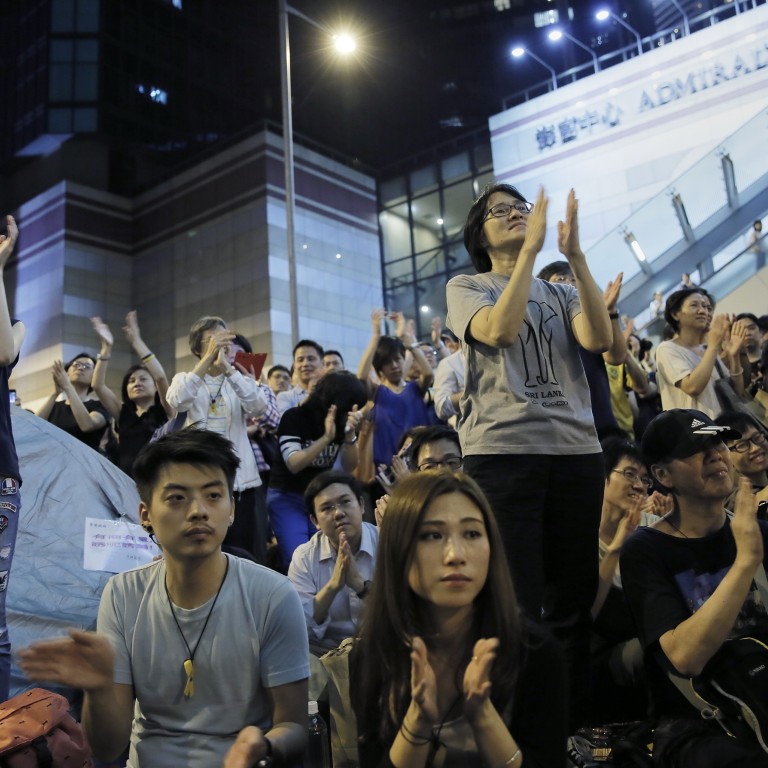
Hong Kong must achieve democracy one step at a time
Regina Ip calls on student protest leaders to take up the government's offer of some room to improve the electoral system, within the limits set by the NPC, or the stalemate will persist
As expected, the first ever dialogue between the government and students on Tuesday failed to deliver any dramatic breakthrough. Despite the students' accusation of a lack of concrete concessions, in the summing-up by Chief Secretary Carrie Lam Cheng Yuet-ngor, the government actually offered more specific deliverables than had been anticipated prior to the meeting.
The first concession was the submission of a report to the State Council's Hong Kong and Macau Affairs Office on developments in public opinion since the National People's Congress Standing Committee decision on August 31. The proposal was decried as futile, as it would not guarantee an overturn of the Standing Committee's decision. But it was put forward in response to students' demand for a "supplementary report" to the central authorities.
Some recent polls show that most people either oppose Occupy Central or doubt it could induce Beijing to change its position. The students' reaction underscores their unrealistic and intransigent attitude. To break the logjam, they need to leave their interlocutors some room for manoeuvre, or a compromise solution to the stalemate will not be found.
The government's offer of a multi-party platform for ongoing dialogue was also flatly rejected. Federation of Students leader Alex Chow saw no need for further dialogue, while 17-year-old representative of Scholarism, Joshua Wong, instead sought a face-to-face meeting with a high-level Chinese leader responsible for Hong Kong affairs.
When secondary students started their sit-in outside Civic Square on September 26, they chanted slogans urging a dialogue with Chief Executive Leung Chun-ying, similar to students' demands at Tiananmen Square in 1989. The students and other prime organisers of the Occupy campaign are well advised to grab this opportunity.
Once the talks get under way, it is likely that the parties would be free to talk about anything impinging on Hong Kong's democratic development, before or after 2017.
The government made two other substantive points. It expressly indicated there would be room for discussion of the nomination and voting procedures within the framework of the Standing Committee's decision. It also indicated that the 2017 package would not be "cast in concrete". There would be room for further development beyond 2017.
Although these points were shrouded in the usual bureaucratic speak, their significance should not be underestimated. The Standing Committee's decision offers room for candidates from the pan-democratic camp to participate.
The NPC decision comes with explanatory notes penned by Li Fei , deputy secretary general of the Standing Committee, which seem to have drawn little attention. The document affirms that the nominating committee shall be composed of members from four sectors in equal proportions, and says that "the delimitation of the various sectors, the organisations in each sector eligible to return members and the number of such members to be returned by each of these organisations shall be prescribed by the electoral law enacted by the Hong Kong Special Administrative Region".
The long and ponderous sentence in which this phrase appears is no more complex than the legal language of common law statutes. It means there is room for the local legislature to adjust the organisations which may have votes on the committee, and the number of their votes. For example, the agriculture and fisheries subsector (one of the 38 currently represented on the Election Committee) has 60 votes, widely regarded as disproportionate to their contribution to Hong Kong's gross domestic product. The government has earlier hinted there could be room for adjustment to this sector's votes, and for inclusion of other organisations to give greater weight to under-represented groups.
There is no reason why the Federation of Students cannot seek votes on the nominating committee through talks with the government and the legislature. Another crucial fact is that the NPC decision stipulates that the nominating committee "shall nominate two to three candidates", and each must have the endorsement of more than half of all members. In the light of this, it is entirely possible that each committee member will be given two to three votes.
With a secret ballot, the possibility cannot be ruled out that some members might give two votes to pro-establishment candidates acceptable to Beijing, but one vote to a moderate candidate from the pan-democratic camp, to ensure a competitive election.
The nominating committee is likely to include patriots who are guardians of the interests of the People's Republic of China, but Beijing will not impose its will on it, and it won't be controlled by a minority of theologians or jurists, as in Iran's Guardian Council.
Salvation for Hong Kong's democratic progress lies in the detail. But progress could only be made if the students, and others determined to settle for nothing short of a total capitulation by Beijing, are willing to engage the government and legislators in rational, detailed discussions.

